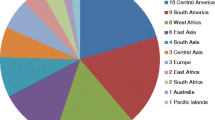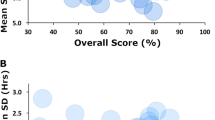Abstract
Purpose
Prior studies have placed emphasis on the need for adequate total sleep time for student performance. We sought to investigate the relative importance of total sleep time compared to the timing of sleep and wakefulness for academic performance.
Methods
We performed a questionnaire-based survey of college students in October 2007. The questionnaire gathered detailed information on sleep habits including naps, reasons for missing sleep, academic performance, study habits, time spent working outside of school, and stimulant use.
Results
Compared to those with the lowest academic performance, students with the highest performance had significantly earlier bedtimes (p = 0.05) and wake times (p = 0.008). Napping tended to be more common among high performers (p = 0.07). Of importance, there were no significant differences in total sleep time with or without naps, weekend sleep habits, study time, gender, race, reasons for staying up at night, nor in use of caffeinated beverages, over-the-counter stimulant pills, or use of prescription stimulants.
Conclusions
Timing of sleep and wakefulness correlated more closely with academic performance than total sleep time and other relevant factors. These findings have important implications for programs intended to improve academic performance by targeting sleep habits of students.
Similar content being viewed by others
References
Karacan I, Anch M, Thornby JI, Okawa M, Williams RL (1975) Longitudinal sleep patterns during pubertal growth: four-year follow up. Pediatr Res 9:842–846
Taylor DJ, Jenni OG, Acebo C, Carskadon MA (2005) Sleep tendency during extended wakefulness: insights into adolescent sleep regulation and behavior. J Sleep Res 14:239–244
Ohayon MM, Roberts RE, Zulley J, Smirne S, Priest RG (2000) Prevalence and patterns of problematic sleep among older adolescents. J Am Acad Child Adolesc Psychiatry 39:1549–1556
Carskadon MA (1990) Patterns of sleep and sleepiness in adolescents. Pediatrician 17:5–12
Carskadon MA, Vieira C, Acebo C (1993) Association between puberty and delayed phase preference. Sleep 16:258–262
Mercer PW, Merritt SL, Cowell JM (1998) Differences in reported sleep need among adolescents. J Adolesc Health 23:259–263
Fukuda K, Ishihara K (2001) Age-related changes of sleeping pattern during adolescence. Psychiatry Clin Neurosci 55:231–232
Reid A, Maldonado CC, Baker FC (2002) Sleep behavior of South African adolescents. Sleep 25:423–427
Wolfson AR, Carskadon MA (1998) Sleep schedules and daytime functioning in adolescents. Child Dev 69:875–887
Beebe DW, Rose D, Amin R (2008) Effect of chronic sleep restriction on adolescents’ learning and brain activity in a simulated classroom: a pilot study. Sleep 31:A77
Estrada A, Killgore WD, Rouse T, Balkin TF, Wildzunas RM (2008) Total sleep time measured by actigraphy predicts academic performance during military training. Sleep 31:A134
http://education.umn.edu/carei/Reports (last accessed 23 February 2009)
http://www.lofgren.house.gov/index.php?option=com_content&task=view&id=337 (last accessed 13 June 2009)
Dinges DF, Pack F, Williams K, Gillen KA, Powell JW, Ott GE, Aptowicz C, Pack AI (1997) Cumulative sleepiness, mood disturbance, and psychomotor vigilance performance decrements during a week of sleep restricted to 4–5 hours per night. Sleep 20:267–277
Eliasson A, Eliasson A, King J, Gould B, Eliasson A (2002) Association of sleep and academic performance. Sleep Breath 6:45–48
Danner F, Phillips B (2008) Adolescent sleep, school start times, and teen motor vehicle crashes. J Clin Sleep Med 4:533–535
Goldstein D, Hahn CS, Hasher L, Wiprzycka UJ, Zelazo PD (2007) Time of day, intellectual performance, and behavioral problems in morning versus evening type adolescents: is there a synchrony effect? Pers Indiv Differ 42:431–440
Wolfson AR, Spaulding NL, Dandrow C, Baroni EM (2007) Middle school start times: the importance of a good night’s sleep for young adolescents. Behav Sleep Med 5:194–209
Trockel MT, Barnes MD, Egget DL (2000) Health-related variables and academic performance among first-year college students: implications for sleep and other behaviors. J Am Coll Health 49:125–131
Teter CJ, McCabe SE, Cranford JA, Boyd CJ, Guthrie SK (2005) Prevalence and motives for illicit use of prescription stimulants in an undergraduate student sample. J Am Coll Health 53:253–262
Wolfson AR, Carskadon MA, Acebo C, Seifer R, Fallone G, Labyak SE, Martin JL (2003) Evidence for the validity of a sleep habits survey for adolescents. Sleep 26:213–216
Cavallera GM, Giudici S (2008) Morningness and eveningness personality: a survey in literature from 1995 up till 2006. Pers Indiv Differ 44:3–21
Acknowledgments
The authors wish to thank Professor Sharon Ward and Dr. Aram Hessami for their expertise in helping develop the questionnaire. We also thank Dr. Shweta Sen for her administrative guidance. We thank all three professors for their invaluable contribution with the distribution and collection of the questionnaire survey.
Author information
Authors and Affiliations
Corresponding author
Additional information
The opinions expressed herein are those of the authors and should not to be construed as official or as reflecting the policies of either the Department of the Army or the Department of Defense.
Rights and permissions
About this article
Cite this article
Eliasson, A.H., Lettieri, C.J. & Eliasson, A.H. Early to bed, early to rise! Sleep habits and academic performance in college students. Sleep Breath 14, 71–75 (2010). https://doi.org/10.1007/s11325-009-0282-2
Received:
Revised:
Accepted:
Published:
Issue Date:
DOI: https://doi.org/10.1007/s11325-009-0282-2




